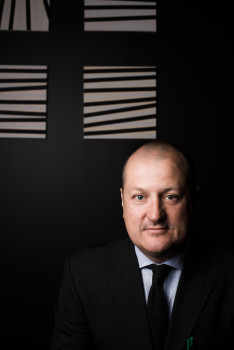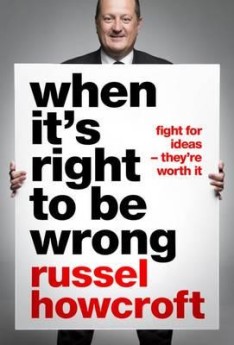Mass marketers need mass machines: Russel Howcroft calls on advertisers to support free TV
 Network Ten’s Melbourne boss Russel Howcroft has called on advertisers to support free-to-air TV to maintain what he says is the only place to reach “many millions of people really quickly”.
Network Ten’s Melbourne boss Russel Howcroft has called on advertisers to support free-to-air TV to maintain what he says is the only place to reach “many millions of people really quickly”.
In a Mumbrella hangout the former ad man admitted it is tougher for TV networks to fund original content as production becomes more expensive and there are increasingly “high production values” needed.
Responding to a question about the challenge of funding original content Howcroft said: “They [original shows] are expensive, and I think what’s happening now is free-to-air TV is competing with high production values. You’ve got to generate the success, generate the viewers to get the revenue…and my view is we should all want that success as we need mass machines, mass marketers in particular need the ability to speak to many millions of people really quickly as that’s what their business relies on.
“So we should all be encouraging these things and making sure we have thriving free-to-air networks.”
https://www.youtube.com/watch?v=c8wOnV-waCY
During the hangout with Mumbrella editor Alex Hayes Gruen panelist Howcroft admitted he was “loud and proud” about pushing the power of TV, admitting “I am a TV salesman,” saying he had been since his days working for ad agencies.
But he warned FMCG brands are making a “huge error” in taking ad spend out of TV and pumping it into digital channels and new product development (NPD), ending up with a “poster” instead of big above the line campaigns.
“I find it really interesting how few FMCG brands I see on the TV but I think it’s an error, I really do,” he said. “I don’t have any empirical evidence, I believe it’s not treating those brands with the respect they deserve.
“FMCG is about buying every day and frequency purchase and for me that’s about continuous communication as well. In a lot of cases those sorts of brands existed to advertise. They did that honourably, every year they’d produce something extra special and they rewarded the consumer with the creativity they were giving them, and I think it is an error to not be on that path.”
He added: “If they took that resource that’s gone into the NPD (new product development) and put that into a commercial and ran it, I suspect they’d get a better result. I think there’s a need to reengage with the power of brand building television.”
 In the hangout, in which he talked about his new book When It’s Right To Be Wrong, Howcroft also addressed his suggestion newspapers sowed the cultural seeds for their decline by giving the front page to journalists from the sales department.
In the hangout, in which he talked about his new book When It’s Right To Be Wrong, Howcroft also addressed his suggestion newspapers sowed the cultural seeds for their decline by giving the front page to journalists from the sales department.
“I’m not saying newspapers are controlled by advertisers, and a separation of the two floors is really important,” he said. “What I’m saying here is there needs to be recognition you need to build a commercial platform, and what I mean by that is respecting the role advertising plays in the business.
“If you push the advertising to the metaphorical back of the book you’re not respecting what you’re there to do, to build a platform. It’s nothing to do with advertisers overtly and covertly influencing journalists thoughts.”
In the book Howcroft asserts that ideas on their own have no value. Pushed on how ad agencies could better monetise the process of ideas creation he said: “I’ve always felt if an agency could find a way to invest in the idea and have some of the upside there might be something in that, but you have to have the money in the first place to invest in it and the client has to be willing as well.
“I have on a number of occasions put an upside model on the table, we’ll take some heat but we’d like some return, but it’s quite difficult to get those models agreed.
“It’s not an easy place to make money which is a pity because it should be and needs to be as marketers all of us need them to be successful, we need their intellect and the way they look at the world, we need their X factor in what they do and that drives incredible success for some businesses. We need to make sure they’re not squeezed out.”
Timeline of conversation:
3:00 – Are Bachelor stars replacing Big Brother contestants as reality media stars?
4:20 – The power of TV: are FMCG brands overusing digital and ignoring TV?
6:40 – “TV is now a direct response medium”
8:20 – “I find it really intersting how few FMCG brands I see on the TV but I think it’s an error”
9:30 – FMCG brands and new product development
10:20 – The power of new news to sell a brand
11:00 – Are we losing creativity in TV ads?
12:20 – Notion that TV advertising is too expensive – but not all TV advertising is expensive
14:00 – Newspapers: Why do you think journalists taking control of the front page seeded their decline?
16:15 – “It’s about the mindset of being a commercial platform fist and foremost”
16:40 – Is it possible for any newspaper controlled by advertisers to win the trust of the audience?
18:00 – Do journalists need to adjust their mindset?
19:20 – “I’ve always felt that advertising is at the very honest and of business because an ad is crystal clear about what it’s trying to do”
20:00 – Native advertising
21:00 – The Advertarian lifestyle
22:40 – Government advertising spending cut back is self defeating
23:45 – Does advertising have an image problem?
24:40 – There are a lot more people wanting to join the industry
25:10 – “Reality check time for Russel – no-one watches TV for the ads, it’s content first and ads second”
25:40 – “People won’t be able to watch the TV without the ads – it’s up to us as marketers to use the platform to get the sale”
26:00 – What impact will subscription services have on the market?
27:50 – Is it becoming harder for networks like Ten to fund original content?
29:30 – What do you mean by the claim Coke Zero is the greatest invention this century?
30:55 – Are big companies not acting in the same way they used to with marketing and using their influence?
32:30 – You say ideas have no value – what do you mean by that?
34:15 – People don’t want to pay for ideas but it’s an ideas business – how can that work?
35:15 – “There could be something in agencies investing in the product themselves”
36:00 – What is it that makes you trust a brand?
39:10 – There’s a new cabinet – what would you like to see from them for the industry?


To misquote Mandy Rice Davies … “Well, he would say that, wouldn’t he?” … Not that I’m suggesting the wheeling and dealing that accompanies the buying and selling of TV advertising has any similarities to the business Miss Davies used to be in.
If the answer is advertising not innovation, then the taxi industry and free to air networks should just get together and solve all the world’s problems.
How odd. We should support free to air television? Like it is a charity. It is just a really odd thing to do to make a request like that. I think the answer would just be no
So good on you Russell – just deliver some audiences, in large numbers. consistently. We advertisers would love to capture mass audiences under 45. Currently, they are just not there.
As a Marketing Director and advertiser I totally agree but it’s also very product/business specific.
TV works for some products but not all.
Hogwash.
Screen Australia gives you the offset and you’re not taking any risks. Start making great shows.
Free to air TV is like firing an algorithm out of a shotgun.
It’s a technology version of advertising targeting that fundamentally hasn’t changed since the 1870s, despite what media planners will tell you.
In brand-product-consumer engagement terms, it’s a raffle.
If it doesn’t change its current form, it will end.
hogwash x2
it is about content and the ease of access to it.
cant remember the last time i watched free to air besides ABC.
Earn your place at the ad table, don’t think it is your god given right to just say give it to us.
I don’t think Russell really understands the problem.
Yes, let’s continue to pump money into a medium that has lost significant audience numbers YOY, continues to promote and flood their schedules with tired formats and is failing to efficiently target anyone under 45.
Ummm…… but FMCG brands may not want to reach millions and millions of people really quickly and consistently… if there are other channels, or ways of buying that can enable us to be more targeted and reduce wastage, it’s a sign of a good FMCG marketer to explore those. We’re managing commercial budgets and growth objectives, not doing things to feel good or be nice to Channel 10 with the budgets we are entrusted with
spray and pray is not the answer to brand problems Russell..